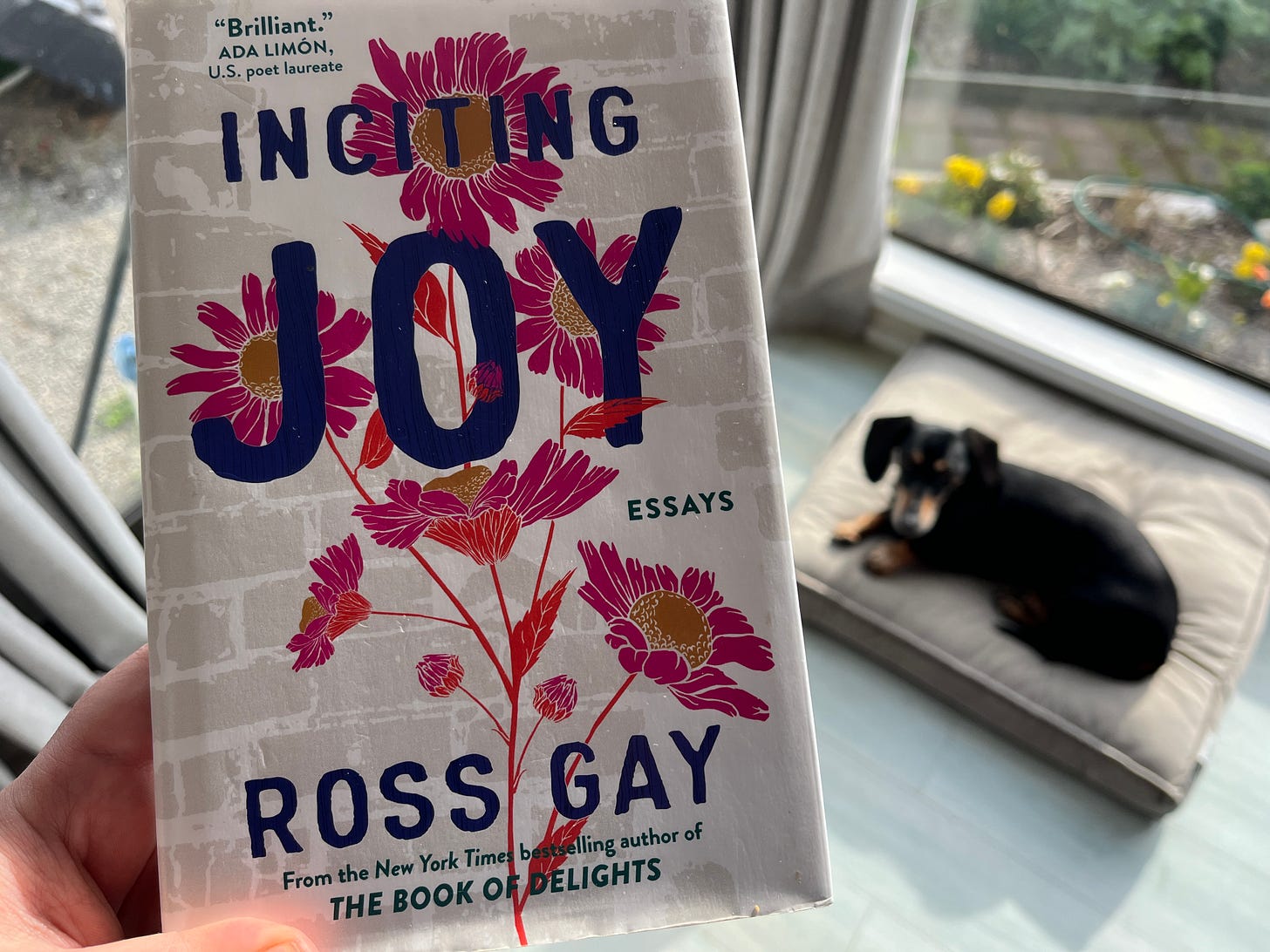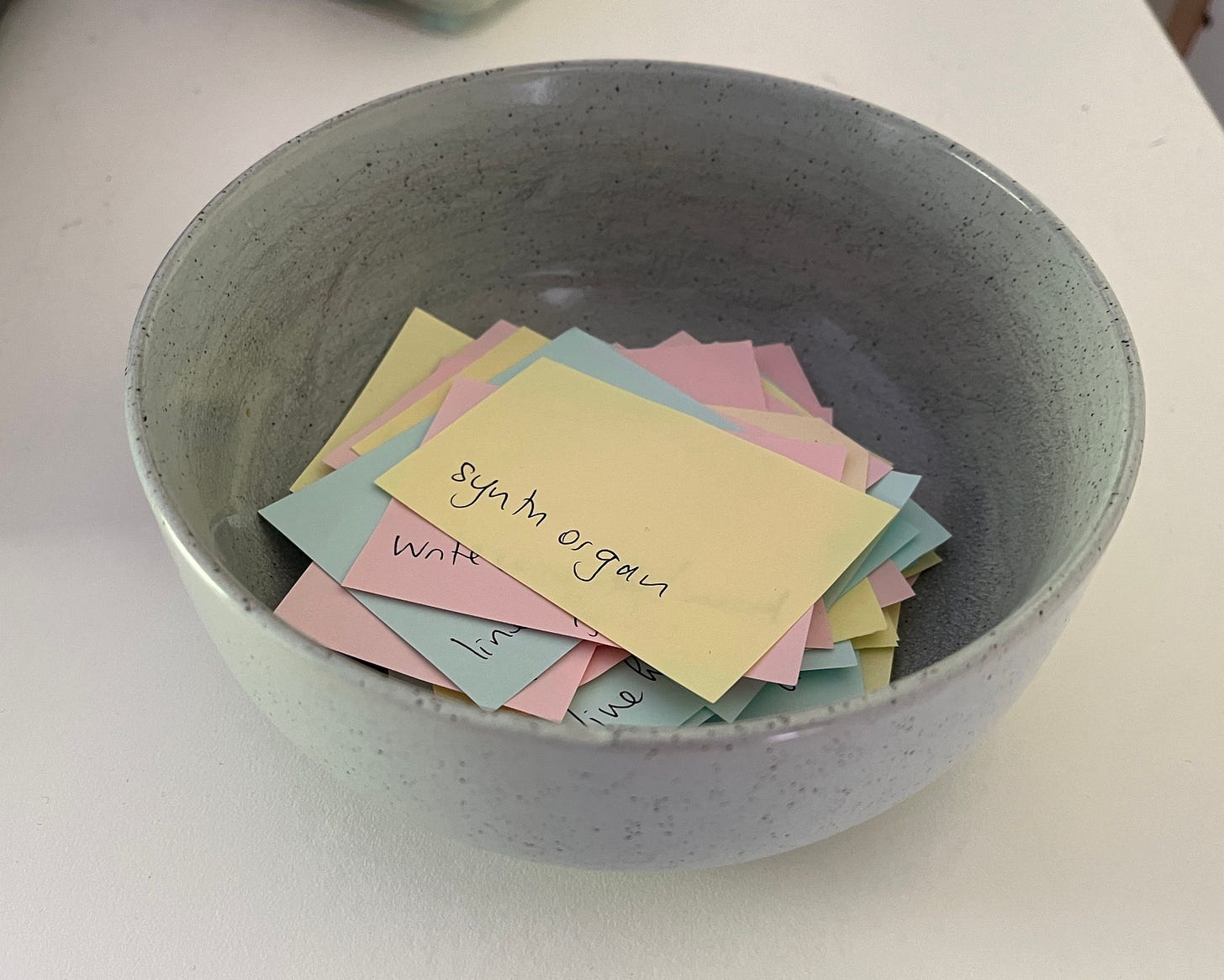I received some lovely feedback on my last post, about Ian Cowan’s (my dad’s) novel Not Our Problem. Dad has very kindly given me a few books to give away to readers. If you would like one, you can email me at katiecowan@substack.com and we will arrange postage. Don’t be shy!
I promised last time that I would write about joy or something, and here I am, writing about joy or something.
One of the pleasures of doing great coaching training is you get to practise your new great coaching training with others who are learning the same great coaching skills. So it is that my new pal Holly - an extraordinary professional working at the intersection of about about five academic and professional disciplines, including anti-colonial systems - held my gaze long enough for me to develop The Game.
I had brought to her my issue: a sense of calling and duty to make music, yet no natural inclination to actually do it. I also brought my plans: another 50 song project, an album, a training regimen. All manner of long, heavy projects that felt properly dutiful.
To me these were also fun options, ways to engage more in what I thought I was trying to do. But she with her coaching eye knew better and said, over and over, “Yeah, but that still sounds like a should.”
She questioned me until my shoulds were clear enough to move aside, and underneath them all I found a version that did not feel like a should. A heart-racing, no rules version of songwriting that brought in play and chaos. I don’t know what you need for creative engagement, but it always helps me to feel slightly out of control, with the wind blowing my hair back.
And so emerged The Game. (Not the PUA game, to be clear, gross.)
In this game, you have three sets of paper with options on. On one, an instrument. On another, an abstract noun or lyric prompt. And on the last, a rule to be broken. (I have developed so many restrictive rules about what I, specifically, am allowed and not allowed to do musically that very little is left that is writeable. I noticed recently that Taylor Swift breaks every one of my self-imposed rules.)
When moved, I would rifle around in my bowl of papers, take one of each colour at random, and use the restrictions to write a song, quickly. Ideally in an hour or less. Feel that wind blow my hair back and punch the air with my fists. Then, move that one aside, and go again.
THIS is creative joy. The pleasure of creative restriction. A reckless shirking of rules. And a dive straight into the good stuff, without enough time for the inner critic to get purchase on all my weird lyric choices. Doing stuff, and then doing other stuff.
I have been thinking a lot about what creativity is for, lately. It is easy to think it is for others: making something so it can be shared or sold, or so that it can become your work. Obviously, it is partly for that, in the way that art has been part of our shared cultural systems for millennia.
But in a world where almost no-one can pierce the algorithm, and where AI encroaches on all of the means by which a creative person could make money from their work, where does that leave us?
I think it returns creativity to us. Not necessarily for mastery, or even for sharing, but for the experience of making something that is in you to make. For the experience of play, and rush, and chaos, or I guess stillness, if that is your jam (weird). I really think that even if you do share or sell your work to others, you have to make art primarily for yourself. Otherwise the world’s systems might break you, and leave you thinking that creativity is somehow not for you.
In supporting me to find The Game, my new pal Holly delivered me right back to where my old pal Ross Gay lives his whole life.
As
puts it, Ross Gay has an, “…unrepentant, unashamed embrace of the tenderest moments of life, no matter how small or silly, whilst never losing touch with the hideousness...”. The ability to hold and engage with both at the same time is why I will revisit him here, again and again.Here’s the piece in Inciting Joy that made me think Ross Gay would enjoy The Game:
“But equally important—or maybe more important, for those of us with some chops anyway—is getting past our desire for mastery, for making it right or doing it well, because a poem isn’t like that. A poem is often naughty if not outright bad. Disobedient, at the least. Well-behaved, god please no. Hates the clothes you think it should wear.
At its best, a good poem, like any good art, is unruly, insubordinate, uncoachable, insolent, and churlish. Surly sometimes, too. Knows your little rules inside and out and thumbs its nose. Sometimes a good poem just don’t wanna.
…But if you think of art as something you wonder about, or listen to, or get lost in the making of, as something that might be trying to show you something you do not yet know how to understand, something that, again, unfixes us, perhaps we can practice making and heeding that.”
May you make what is in you to make.
May you reclaim creativity from your shoulds, at least once in a while.
May you make your own version of The Game and let me know what happens. 👀
Until next time
Katie






I had a go
'Should' like wood, weighs you down.
For me, feels free to be a clown.'